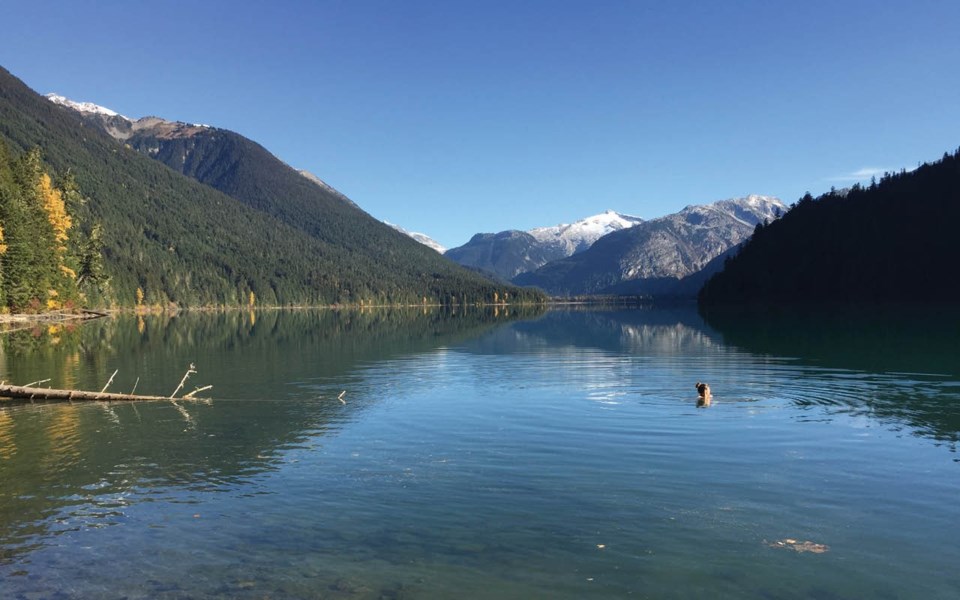It's a gorgeous fall day. Clear, crisp air; stunning colours; and peaks that stand out in a sharp, surreal diorama. Cheakamus Lake is as still as a pond, and, from the height of the trail, reflects the preternatural robin-egg-blue of an alpine lake. I view these ice-cold waters as simply part of the picture before me, but the person I'm with has other ideas: they want to be part of the picture, too, meaning in the lake. I don't shudder as hard at the thought as I used to, because I've been through it many times. You see, my partner Asta has a thing for cold water that has become a bit of a habit, one I'm not sure even the advent of winter ice will quell. But at least it's an interesting and—dare I flirt with paradox—heartwarming story.
"Spring was hitting and I was thinking about how I wanted to do more cool-water swimming in the future," she recalls. "So I emailed my friend Nevada Christianson and said I was thinking it would be nice to swim in Whistler's lakes more often this year, and she wrote back and said 'Sure—how about today?' It was April 1 and starting to snow, but we went to Alpha Lake anyway, where the ice had just gone off."
And in they went.
"I can't remember the exact sensations but it was really frickin' cold," she continues. "The idea was to just lower ourselves in and try and take a few controlled breaths because it was a such a shock to the system. But I came away thinking 'Wow—the cold water has me feeling really alive.'"
Their spontaneity wasn't as crazy as it sounds. Both had done plenty of cold-water plunging at the Scandinave Spa where they worked, and they'd become interested in the methods of Dutchman Win Hof, a.k.a. "The Iceman." An extreme athlete able to withstand ridiculous cold, Hof attributes the ability to his Wim Hof Method (WHM) breathing techniques. Hof—who believes WHM and cold-immersion can help alleviate the symptoms of a range of illnesses—holds 26 world records, including the Guinness World Record for immersion in an ice bath at 1 hour, 52 minutes, and 42 seconds.
"We knew the benefits of cold for inflammation and pain, which we both had issues with," says Asta, "and that research was finding cold plunging also helped with things like depression and anxiety, so it was clearly beneficial."
The dipping continued. After a few improbable Instagram posts, other ladies expressed interest. Soon, a small rotation were joining up for a daily cold-water dip, often early in the morning. The loose-knit "Alpine Life Aquatic" club practiced around the valley—at Alpha, Nita, and Green Lakes (Alta Lake was deemed too warm). At a certain point, however, they realized that going every day held its own benefit. "It became about spending this window of time both by the water and in the water, feeling what it was like in your body more than the temperature," said Asta. "If we missed a day, we felt we'd missed a spark—you just didn't feel as energized."
Summer hiking adventures included the goal of an alpine swim. The ladies dipped in Petgill, Brew, Cheakamus, Lucille, and Gates Lakes; tarns, icy rivers, and the Pacific Ocean. For Asta, any road trip (with me standing by to hand her a towel) included stops at frigid lakes like Pavillion, McLeese, and 10-Mile Lakes, as well the Taseko, Chilko, Chilcotin and Fraser rivers during a lengthy rafting trip.
After reaching 100 days on July 20, it looked like a bona fide mission to outsiders. But there was no attempt to "keep the streak alive." Instead, it continued as a simple search for a daily dose of well-being. There'd be mugs of tea and chats on the dock. "The cheapest, easiest way to build community in Whistler is to throw out an enjoyable, accessible little challenge that you can share," Asta tells me.
With the arrival of fall, the water has returned to spring temperatures, reinvigorating the challenge. "When it's super hot in the summer, even the coldest water feels good and doesn't require you to pay much attention. But now you can feel that edge again—your body reacting and responding. It's an intense experience and the colder it gets the more mindful you have to be of your breathing. You have to focus more, which is meditative and part of the whole experience."
Over time, Asta has inspired her sister, mother, several friends—even myself on occasion—to be at one with the cold. But that was never the intent. Now closing in on 200 days, she'll probably hit that number before ice-over. Oddly, she notes, the view from the water helped make it one of her most memorable summers without going anywhere outside of B.C.
"It made the stretch of time between spring and fall more enjoyable—the seasons spread out in a different way because you really paid attention and saw every last bit of them."
Leslie Anthony is a Whistler-based author, editor, biologist and bon vivant who has never met a mountain he didn't like.




